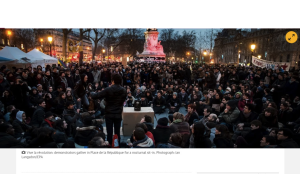. . SUSTAINABLE DEVELOPMENT . .
For CPNN by Kiki Chauvin
“They turn off the lights, but we light up our brains! ”
The citizen movement “Nuit Debout” (Night Standing in Place) was born on March 31 following a demonstration against the projeted law of El Khomri a contested reform of the labor code and the release of the film by François Ruffin ” “Thank you, boss”.

(Click on photo to enlarge)
Photograph: Ian Langsdon/EPA
The gathering, which is more or less spontaneous, is run by men and women who have rapidly organized themselves in geneal assemblies ”made with the means at hand ” and by their own skills.
La Place de la Republique has become an area of freedom, where everyone, each person can speak and participate in debates and in the work of organizational or thematic commissions such as logistics (responsible for the smooth running of the gathering), communication, coordination, reception and mediation (reception and security). The Democracy Commission, is a center for debate and responsible for the voting system. Topics such as labor law, unemployment, insecurity, ender equality, the “Panama papers’’ scandal and whistleblowers are debated.
The movement, which continues to grow, is surprisingly young, even though it includes some people of all ages.
The modus operandi is based on humanist, peaceful values. It is the exchange of ideas and sharing of anger in a framework of respect for others, listening and self-disciplined speech. People listen to each other in the debates and they are translated into sign language.
(Article continued in right column)
(Click here for the original article in French.)
Movements against governmental fiscal austerity, are they part of the global movement for a culture of peace?
(Article continued from left column)
Although this movement is not like the traditional manifestations of Paris, its members are determined to show their insubordination by civil disobedience without adhering to political parties or official bodies.
They are determined to take back the language of revolt that has been stolen by a political class in France that has become “professional” and that has taken over the public space. They have given form to the slogan of the World Social Forum born in Brazil, “Otro mundo es posible” (Another world is possible).
This form of movement is a first in France, but it is similar to what happened in 2011 with the Arab Spring and Occupy Wall Street in the USA and the Indignados in Spain.
The mobilization is growing everywhere, in sixty French cities but also in other countries including Belgium, Germany, the Netherlands, Spain, Canada, ….
The appearance of groups of thugs in parallel around the Place de la Repulique appears to be an attempt to discredit and disturb the security of the movement which, conversely, acts without violence.
Despite its innovative breath of fresh air and its optimistic tone of hope, one can question the result that will be achieved by this movement. Even if its aim is clearly progressive, is there not a risk of its horizontal confinement, a kind of “inbreeding” that may occur if it does not succeed in involving other social strata (workers, rural, suburban ..), moving to other “public places”, going out to the people?
In any case, the movement brings us an important message, and as described by the sociologist Albert Ogien: “It is a modern form of political action, comparable to the strikes and sit-ins of previous generations, but quite new in France ../.. ”